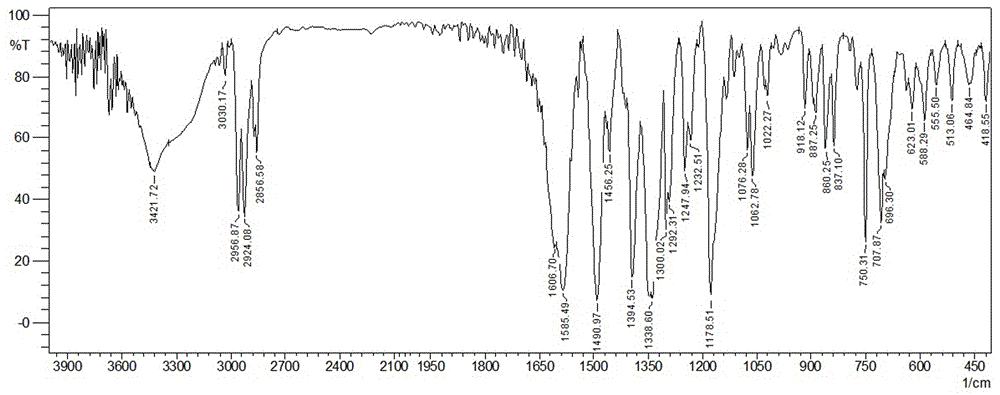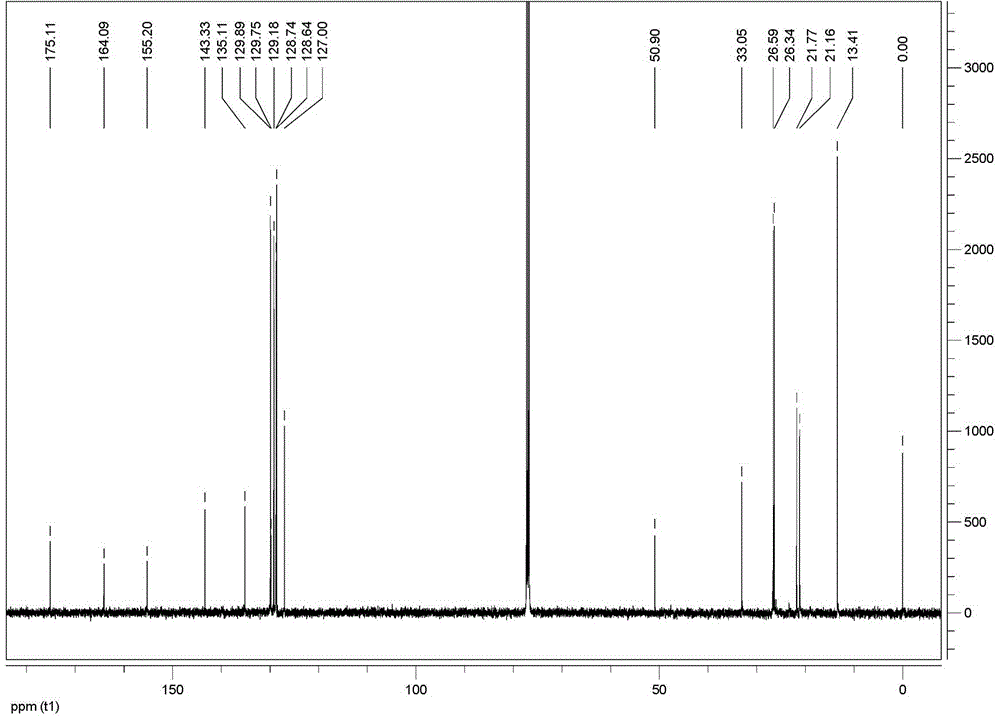2-carbonyl-3-phenylpropionic acid p-methyl benzoyl hydrazone bis-n-butyl tin complex and preparation method and application thereof
A technology of di-n-butyltin and di-n-butyltin oxide with toluylhydrazone, which is applied in the fields of tin organic compounds, pharmaceutical formulations, organic chemical methods, etc., can solve the problems of undiscovered compounds and achieve simple preparation methods, The effect of high cancer activity and low cost
- Summary
- Abstract
- Description
- Claims
- Application Information
AI Technical Summary
Problems solved by technology
Method used
Image
Examples
Embodiment 1
[0042] Preparation of 2-carbonyl-3-phenylpropionic acid p-methylbenzoylhydrazone di-n-butyltin complex:
[0043] Add 0.249g (1.0mmol) di-n-butyltin oxide, 0.150g (1.0mmol) p-toluylhydrazide, 0.205g (1.1mmol) sodium phenylpyruvate and 15mL solvent in a 100mL three-necked flask protected by nitrogen Anhydrous methanol, react at 45~65°C for 8 hours, cool, filter, and control solvent volatilization and crystallization at 20~35°C to obtain yellow transparent crystals, namely 2-carbonyl-3-phenyl p-toluylhydrazone di-n-butyltin propionate complex. Yield: 85.5%. Melting point: 97~99°C (dec).
[0044] Elemental analysis (C 52 h 72 N 4 o 8 sn 2 ): Calculated: C 55.84, H 6.49, N 5.01; Found: C 55.90, H 6.45, N 5.00.
[0045] FT-IR (KBr, ν / cm -1 ): 3421, 3030, 2956, 2924, 2856, 1606, 1585, 1490, 1394, 1338, 1300, 1178, 1062, 1022, 918, 960, 837, 750, 707, 623, 588, 5455, 6.45
[0046] 1 H NMR (500 MHz, CDCl 3 , δ / ppm): 8.14 (d, J =8.1 Hz, 2H), 7.54 (d, J =7.0 Hz, 2H), 7.30...
Embodiment 2
[0051] Preparation of 2-carbonyl-3-phenylpropionic acid p-methylbenzoylhydrazone di-n-butyltin complex:
[0052] Add 0.248g (1.0mmol) di-n-butyltin oxide, 0.150g (1.0mmol) p-toluylhydrazide, 0.195g (1.05mmol) sodium phenylpyruvate and 35mL solvent in a 100mL three-necked flask protected by nitrogen Anhydrous methanol, react for 5 hours at a temperature of 45~65°C, cool, filter, and control solvent volatilization and crystallization at a temperature of 20~35°C to obtain a yellow transparent crystal, which is 2-carbonyl-3-phenyl p-toluylhydrazone di-n-butyltin propionate complex. Yield: 87.5%. Melting point: 97~99°C (dec).
[0053] Elemental analysis (C 52 h 72 N 4 o 8 sn 2 ): Calculated: C 55.84, H 6.49, N 5.01; Found: C 55.90, H 6.45, N 5.00.
[0054] FT-IR (KBr, ν / cm -1 ): 3421, 3030, 2956, 2924, 2856, 1606, 1585, 1490, 1394, 1338, 1300, 1178, 1062, 1022, 918, 960, 837, 750, 707, 623, 588, 5455, 6.45
[0055] 1 H NMR (500 MHz, CDCl 3 , δ / ppm): 8.14 (d, J =8.1 Hz...
Embodiment 3
[0060] Preparation of 2-carbonyl-3-phenylpropionic acid p-methylbenzoylhydrazone di-n-butyltin complex:
[0061] Add 0.248g (1.0mmol) di-n-butyltin oxide, 0.158g (1.05mmol) p-toluylhydrazide, 0.214g (1.15mmol) sodium phenylpyruvate and 25mL solvent in a 100mL three-necked flask protected by nitrogen Anhydrous methanol, react for 24 hours at a temperature of 45~65°C, cool, filter, and control solvent volatilization and crystallization at a temperature of 20~35°C to obtain a yellow transparent crystal, which is 2-carbonyl-3-phenyl p-toluylhydrazone di-n-butyltin propionate complex. Yield: 88.8%. Melting point: 97~99°C (dec).
[0062] Elemental analysis (C 52 h 72 N 4 o 8 sn 2 ): Calculated: C 55.84, H 6.49, N 5.01; Found: C 55.90, H 6.45, N 5.00.
[0063] FT-IR (KBr, ν / cm -1 ): 3421, 3030, 2956, 2924, 2856, 1606, 1585, 1490, 1394, 1338, 1300, 1178, 1062, 1022, 918, 960, 837, 750, 707, 623, 588, 5455, 6.45
[0064] 1 H NMR (500 MHz, CDCl 3 , δ / ppm): 8.14 (d, J =8.1 Hz...
PUM
 Login to View More
Login to View More Abstract
Description
Claims
Application Information
 Login to View More
Login to View More - R&D
- Intellectual Property
- Life Sciences
- Materials
- Tech Scout
- Unparalleled Data Quality
- Higher Quality Content
- 60% Fewer Hallucinations
Browse by: Latest US Patents, China's latest patents, Technical Efficacy Thesaurus, Application Domain, Technology Topic, Popular Technical Reports.
© 2025 PatSnap. All rights reserved.Legal|Privacy policy|Modern Slavery Act Transparency Statement|Sitemap|About US| Contact US: help@patsnap.com



